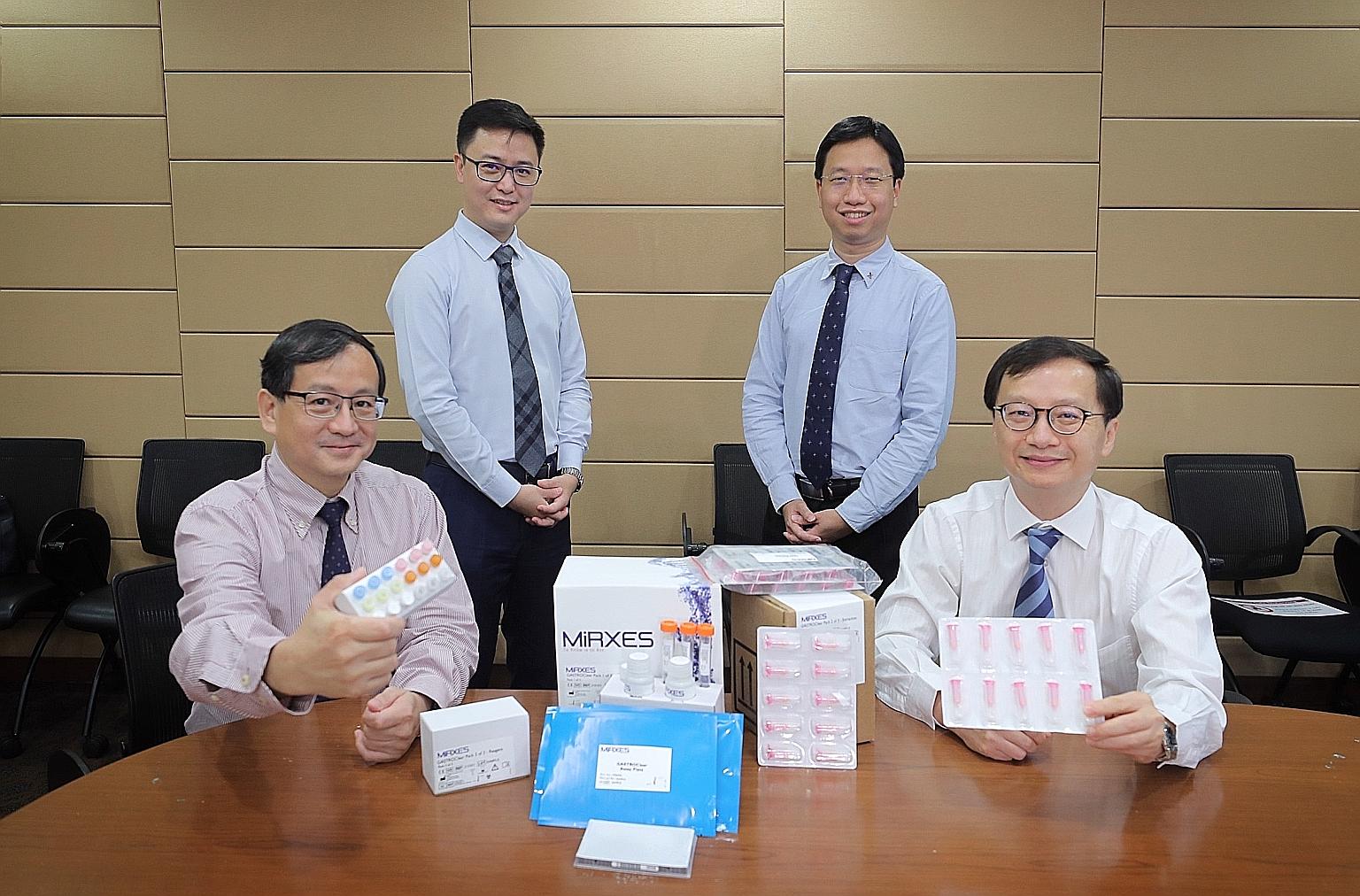Blood test kit rolled out to detect gastric cancer early
Non-invasive test being evaluated for use in primary care settings such as polyclinics
Sign up now: Get ST's newsletters delivered to your inbox

From left: NUS Yong Loo Lin School of Medicine's Associate Professor Too Heng-Phon, MiRXES co-founder and CEO Zhou Lihan, NUH's Division of Gastroenterology and Hepatology consultant Calvin Koh and NUH's Professor Jimmy So with the gastric cancer test kit. It is priced at under $200 at public hospitals.
ST PHOTO: GAVIN FOO
A blood test kit that can accurately detect gastric cancer in its early stages is being rolled out in local hospitals and evaluated for use in primary care settings such as polyclinics, said the National University Health System (NUHS) on Friday.
The test kit, known as Gastroclear, is the first of its kind in the world. It has been progressively rolled out in public hospitals such as National University Hospital (NUH) and Tan Tock Seng Hospital, some private general practitioner clinics and specialist clinics for pre-screening of gastric cancer.
This form of cancer is usually diagnosed through endoscopy, a procedure perceived to be expensive and invasive, as it involves inserting a thin tube with a camera into the patient's mouth and all the way down to the stomach.
According to the Ministry of Health's website, an endoscopy costs around $200 to $800 with medical subsidy.
Using the blood test would be more cost-effective - it is priced at under $200 at public hospitals. The test is also non-invasive, can encourage higher uptake among the public for early detection of the cancer and reduce reliance on endoscopy.
The test can detect 87 per cent of all gastric cancers, including 87.5 per cent of stage one cancers, compared with conventional blood tests which have only an accuracy rate of between 50 per cent and 60 per cent.
This is because conventional tests are usually used for monitoring the patient's response to cancer treatment or cancer recurrence, and are not suitable for identifying cancer patients.
The project to develop the new blood test began in 2012.
It was led by Professor Jimmy So, head and senior consultant with NUH's Division of General Surgery (upper gastrointestinal surgery); Professor Yeoh Khay Guan, senior consultant with NUH's Division of Gastroenterology and Hepatology; and Associate Professor Too Heng-Phon from the National University of Singapore Yong Loo Lin School of Medicine's Department of Biochemistry.
The team also included clinicians and scientists from NUHS, the Bioprocessing Technology Institute (BTI) of the Agency for Science, Technology and Research (A*Star), national platform Diagnostics Development (DxD) Hub, and MiRXES, a molecular diagnostic company which was spun off from BTI.
The test kit was first manufactured in 2012, and has been able to differentiate between gastric cancer patients and normal patients using 12 microRNA biomarkers with an accuracy rate of 92 per cent.
-
GASTRIC CANCER
In Singapore, gastric cancer is the fifth leading cause of cancer deaths in men and the sixth in women, claiming around 300 lives yearly.
It is the third leading cause of cancer deaths worldwide, claiming 780,000 lives annually, as it is often detected at the later stages, making it difficult to treat.
The cancer is more common in Asia, with countries such as South Korea, Japan and China experiencing higher rates.
Patients at high risk include those who are aged 50 years and above, with higher prevalence among Singaporean Chinese males.
Patients who had previous Helicobacter Pylori (H. pylori) infection, which is bacteria infection of the lining of one's stomach, are also at higher risk. However, the source of H. pylori infection is currently unknown.
More than half the gastric cancer patients are elderly.
Common symptoms of gastric cancer include stomach discomfort in the upper abdomen, vomiting, weight loss, and black-coloured stool.
In the early stages of the cancer, the symptoms tend to be fewer.
Between 2013 and 2018, it was validated among some 5,000 subjects from Singapore and received approval from the Health Sciences Authority last year.
Said Prof So: "The majority of gastric cancer patients are diagnosed at advanced stages, for which the five-year survival rate is lower than 5 per cent.
"On the other hand, the five-year survival rate for stage one cancer is at more than 90 per cent. Early detecting is thus key to reducing death from gastric cancer."
As it costs less than endoscopy, the test could potentially be used as part of the national screening programme for gastric cancer in high risk groups.
Assoc Prof Too, however, emphasised that the test does not replace endoscopy, and instead provides an option to patients who may not be keen on initial endoscopic screening.
This is because endoscopy still remains the gold standard for accurately diagnosing gastric cancer, as it involves a biopsy of the affected tissue.
Instead, the test "adds to the current cancer detection tool armamentarium" by offering a pre-screening option for at-risk patients, so that those with gastric cancer can be identified early.
The team is now looking to develop similar blood tests for early diagnosis of lung, liver and breast cancers.


